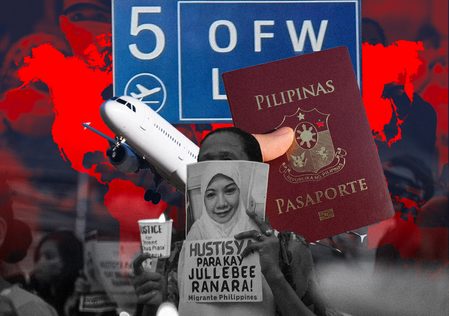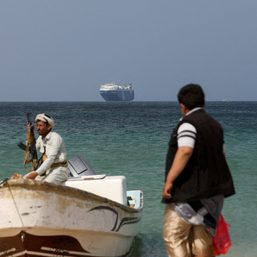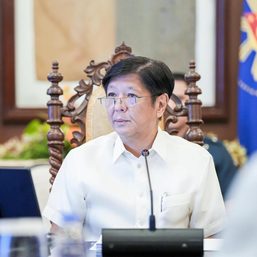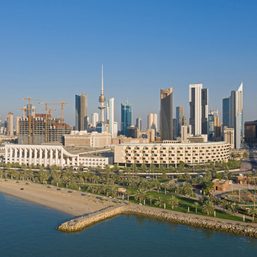SUMMARY
This is AI generated summarization, which may have errors. For context, always refer to the full article.

MANILA, Philippines – A promise made by former president Rodrigo Duterte was left for his successor, Ferdinand Marcos Jr., to fullfill: ensure greater protection for the millions of overseas Filipino workers (OFWs) through a department dedicated solely to their needs.
The creation of the Department of Migrant Workers (DMW) in December 2021 was the fulfillment of one of Duterte’s campaign promises. The department consolidated all OFW-related offices in the labor, foreign affairs, and social welfare departments. Both formerly under the labor department, the Philippine Overseas Employment Administration was merged into the DMW, while the Overseas Workers Welfare Administration was kept as an attached agency.
The consolidation of the offices was intended to make it easier for migrant workers to secure their documents and seek help from government. No more running to different offices, no more delayed action for distress cases, and no more “grumpy” consular officials. The DMW was the OFWs’ new “home.”
The department became fully operational only in 2023, when it acquired its first budget. But Marcos wanted to hit the ground running, appointing long-time OFW rights advocate and former labor undersecretary Susan “Toots” Ople to be his DMW secretary in May 2022.
This isn’t the first time the Philippines has had a Marcos and Ople in government together – decades ago, the President’s father, late dictator Ferdinand E. Marcos, had Ople’s father Blas Ople as his labor secretary.
Marcos Jr. was so proud to have her that she had a special mention in his inaugural speech: “There will be changes starting tomorrow. I am confident because I have an Ople in my Cabinet.”

In a Malacañang briefing at the beginning of 2023, Ople, equipped with the department’s very first P15.8-billion budget, said that it would be a “very busy year” as it continued to transition and enhance its personnel across all offices to serve OFWs and their families better – from before the workers leave to when they come home and reintegrate. The secretary outlined goals to put up more country-wide regional offices and Migrant Workers Offices (MWOs) abroad, and hire 1,000 new staff.
By end-March, the department was looking to hire at least 842 employees across the central office, regional offices, and MWOs. MWOs were formerly known as Philippine Overseas Labor Offices or POLOs, and were previously under the Department of Labor and Employment. The DOLE turned the POLOs, and its other offices catering to OFWs, over to the DMW in July 2022.
Months later, while the department adjusted, OFWs continued to adjust as well. Some have said overseas Philippine labor officials are easier to reach now. Others say it’s just the same – delays and inaccessibility hound many distress cases, some of which are only catered to when they go viral.
Groups and analysts have also flagged an apparent labor export policy, a plan Marcos made known when he was a presidential aspirant. In Marcos’ various international trips, Ople was by his side in most, if not all, of them. Marcos and Ople reported back to the Philippines to say Filipino workers are wanted in Europe, or North America, or the Gulf states.
Is it the right direction?
DMW’s Year 1 report
In a statement on June 30, a year since Marcos became Philippine president, Ople said the department was able to “overcome the many hurdles of transitory work because of the team spirit that enabled us to tap the expertise of other departments and agencies of the national government.”
The department prided itself on being able to put together programs and services for OFWs and their families “a year ahead of schedule.” Ople put the spotlight on DMW efforts during the civil war in Sudan, its attention to longstanding issues involving laid-off construction workers in Saudi Arabia, and adjustments that deemed the Philippines compliant with international maritime standards.
During the Sudan crisis, the DMW, along with the Department of Foreign Affairs (DFA) and other government agencies, was able to repatriate more than 700 Filipinos and provide them with financial and livelihood assistance.
Marcos was credited with actively engaging with the maritime sector that led to the European Union judging the Philippines compliant with the International Convention on Standards of Training, Certification and Watchkeeping for seafarers after almost 20 years of deficiencies.
Meanwhile, around 10,000 OFWs who worked in construction firms that went bankrupt in Saudi Arabia around eight years ago finally saw some certainty they would receive their labor claims. After Saudi Crown Prince Mohammad bin Salman assured Marcos the workers would receive their claims, the DMW regularly gave updates about bilateral talks with the kingdom.
Salman’s promise to Marcos was made on the sidelines of the Asia-Pacific Economic Cooperation Summit in Bangkok in November 2022, but as of posting, the money has yet to reach workers.
“In my bilateral talks with Minister Ahmad bin Sulaiman Al Rajhi of the Ministry of Human Resource and Social Development, he said the funds to pay the unpaid wages and benefits of our OFWs are now with the Ministry of Finance and there is an inter-agency committee looking at how to efficiently manage the processing of such claims,” said Ople.
She said that the DMW is hopeful that the matter will be resolved “soon.”
“The first year of President Marcos Jr. yielded solutions to long-festering problems besetting our OFWs… because the goals were clear, the focus sharp, and the all-important team spirit was very much felt across the bureaucracy,” Ople said.
The secretary also noted how deployment – both in land- and sea-based jobs – was up, as evidenced by the increase of dollar remittances sent in 2022. “That we also have the best workers in the world cannot simply be denied – they remain and will always be our modern-day heroes,” she said.

‘More focus’
According to Joseph Leron, a Filipino community leader in Abu Dhabi, the integration of the DMW into the Philippine government’s presence in the city was quickly felt. The Abu Dhabi MWO is currently headed by officer-in-charge assistant labor attaché Jesus Vicente Magsaysay.
“Now, there is more focus [on distress cases]. It is unlike before when it would take more than three months sometimes before an OFW can go home. Now that we have a DMW, along with the Philippine embassy’s coordination with the government of the United Arab Emirates, it’s much faster. Actually, we’ve had an experience where within three days, one of our distressed OFWs here was repatriated,” Leron said in a mix of English and Filipino.
Leron, vice chairperson of Philippine embassy-recognized Bayanihan Council, said that in his experience, a message does not go ignored for more than 24 hours. He said that the department’s goal to be a one-stop-shop, or the single office OFWs can run to, is felt by the Filipinos he has catered to.
The community leader acknowledged that delays still occur sometimes in responding to appeals for assistance. “Apologetic naman sila. Ine-explain nila why they have the delay,” he said. (They are apologetic, and they explain why they have delays.)
Illegal recruitment is the most common form of distress Leron’s group has monitored in Abu Dhabi, but it is in “money issues” where there are delays, he said. These include Filipinos caught up in debt, some of whom get stranded because they want to go home but are unable to settle.
Leron is affiliated with the OFW Global Movement for Empowerment, a group that supported Rodrigo Duterte’s presidential bid in the 2016 elections, and in 2022, the tandem of Marcos Jr. and then-vice presidential candidate and presidential daughter Sara Duterte.
Where many OFWs choose to go
The United Arab Emirates (UAE) is second to Saudi Arabia as the most popular destination for OFWs, with over 262,800 workers as of 2021, according to the Philippine Statistics Authority (PSA). The Middle East remains to be the most populous region to host OFWs, and is the area where many cases of abuse and exploitation are reported. (READ: History of OFW deployment bans in the Middle East)
According to the 2021 data, the top five country destinations for OFWs – Saudi Arabia, UAE, Hong Kong, Kuwait, and Singapore – hosted more than half of the OFW population. Women comprise the majority of the migrant workers abroad, at 60.2%.
All top five countries have MWOs, in other words, the presence of the DMW. Pre-DMW, the establishment of MWOs or POLOs was prioritized in countries with a large concentration of OFWs.
Elsewhere, opposite experiences
While Leron reported a mostly positive experience for the Filipino community in Abu Dhabi, rights groups flagged a lack of change, as well as the persistence of migration issues pre-Marcos.
“The services have not been faster,” said Romeo Hebron, executive director of United States-based nonprofit Filipino Migrant Center (FMC). “It’s continued to be the same with slowness of services, being able to schedule appointments, things like that.”
In comparing the nonprofit’s coordination with the Marcos government and previous administrations, Hebron said that “it’s the same in terms of low or weak coordination.”
“We do want to help our people as a nonprofit, right? And I think that something that could be strengthened on the Philippine government side is how to also be able to partner with nonprofit organizations to also help provide some of those services,” he said.
FMC caters mostly to immigration distress cases that involve undocumented migrants. They also assist exploited domestic workers.
“If they really provided for the needs of the people, then we wouldn’t even need to be around. But the fact is, there’s a huge gap in services, and so we do have to provide that assistance,” said Hebron.
On July 1, Assistance to Nationals (ATN) services, which include legal and welfare services for distressed OFWs, were transferred from the DFA to the DMW in areas where there are MWOs. There is one in Los Angeles in Southern California, where FMC’s work is concentrated. Hebron said that speeding up services has yet to be seen in the transfer of the ATN services.
Ople’s first flagship program, launched in July 2022, was the One Repatriation Command Center. The department envisioned it to be a one-stop center for distressed OFWs’ families to keep track of their cases until they are able to come home to the Philippines.
But one year later, progressive OFW rights organization Migrante International flagged the lack of “significant changes” in the government’s repatriations.
“Kung hindi pa tinutulak, hindi pa nag-a-assert ang mga organizations, organized OFWs overseas and in the Philippines, the action to respond to these distressed cases ay mabagal pa din,” said Migrante International chairperson Joanna Concepcion. (If organizations and organized OFWs in the Philippines do not push or assert, the action to respond to these distressed cases is still slow.)
Concepcion said that complaints that the group has heard from before still emerge today, such as no responses or acknowledgments of emails or calls, even in some emergencies. The government also looks to recruitment agencies to undertake monitoring of the OFWs they deploy.
The monitoring of distress cases became a subject of scrutiny in one of the Senate hearings on the brutal killing of Kuwait-based OFW Jullebee Ranara allegedly at the hands of her employer’s son. Ranara’s untimely death is one of the most high-profile cases the DMW has had to handle, and is part of a string of OFWs’ violent deaths in Kuwait. Her killing also triggered diplomatic actions from each of the countries. (READ: No justice for Jullebee Ranara, no new domestic workers for Kuwait – DFA)
On June 27, the Sandigan ng mga DH sa Gitnang Silangan (Advocate of Domestic Helpers in the Middle East) posted a video of a group of distressed OFWs in Saudi Arabia who tried to seek help from their recruitment agency after being overworked by their employers. In the video, the OFWs appealed for help as their recruitment agency allegedly locked them in an accommodation, and attempted to sell them to other employers.
“Pinipilit pa rin po kaming magtrabaho kahit gustong-gusto na naming umuwi. May mga pamilya po kaming nag-aantay sa ‘min,” one of the OFWs said, with despair in her voice, unable to fight back tears. (We are forced to work even if we badly want to go home. We have families waiting for us.)
By June 28, DMW Undersecretary Hans Cacdac said that the matter had reached the department’s knowledge, and Ople had requested him to proceed to Saudi Arabia.
“They needed to become viral, or they needed to expose themselves online, crying, because they’re desperate to go home. Does it need to reach that point before action happens?” asked Concepcion.
More jobs abroad, the better?
Numerous countries have expressed interest in hiring Filipino workers, and are in talks with the DMW. These include the UAE, Qatar, Oman, the Czech Republic, Hungary, Portugal, Austria, and Singapore. In May, the DMW reported that Saudi Arabia sought to hire one million skilled Filipino workers in the next two years.
With more deployment also came a review of rules for recruitment agencies, as the department “simplified” the penalty system for erring agencies. It outlined 20 “mortal sins” that may lead to the suspension of an agency’s license, such as deploying minors, charging unauthorized placement fees, and placing Filipino workers in “harmful” jobs.
Political science professor Carmel Abao said that her understanding of Ople’s higher deployment targets are within the context of economic recovery from the COVID-19 pandemic. From January to April 2023, the Philippines deployed over 817,000 workers, higher than the total deployed in 2020 – which was around 550,000 – and in 2021, which was over 742,000.
But Shiella Estrada, president of Pin@y Careworkers Transnational, questioned the wisdom of holding more bilateral labor talks with other countries. (READ: PH deploying workers faster than it can protect them – OFW rights group)
“Nakakalungkot lang kasi ang DMW ngayon… Parang ipinagmamalaki ‘yung maraming country [na] kausap para doon magkaroon ng mga trabaho ang mga Pilipino. Parang nakakababa ng morale, ‘di ba? Ang tingin namin sa ganoon, so hindi kayo gumagawa ng paraan, hindi rin kayo parang naghahanap ng solusyon doon sa mga problema na nagki-create ng migration,” she said.
(It’s sad because the DMW seems to be boasting how it is in talks with many countries to create more jobs for Filipinos. Doesn’t that just bring down your morale? For us it’s like, so you’re not trying to find solutions to the problems that create migration.)
“Dapat i-lessen ‘yung migration, ‘di ba? At dito gumawa ng mga trabaho, hindi ‘yung panay ang biyahe para maghanap ng country na kausap para tanggapin ang mga Pilipino,” Estrada added. (Migration should be lessened, right? And jobs should be created here – you should not be going on trips to find countries to ask to accept Filipinos.)

Concepcion of Migrante also noted that, although media often report on physical and sexual abuses, the most common complaints reported to their organization are labor-related issues – such as nonpayment or delayed salaries, or overwork. She believes that this is closely tied to the labor export framework.
“This is not just domestic helpers. All industries, whether it’s in the service [sector], whether it’s even skilled workers…. They are still migrant workers in the host countries who are exploited alongside other migrant workers who are not Filipino. So this isn’t actually just about Filipino migrant workers, it’s all migrant workers who are recruited from developing countries na the framework remains to be, they want to recruit foreign labor kasi mas mura (because it is cheaper),” she said.
But a cheap salary payment for a foreign employer could mean the world for an OFW and his or her family. In its World Development Report 2023, the World Bank said that remittances from migrants have proven to be a “powerful instrument for reducing poverty in origin countries.”
In the Philippines, remittances are used to fund the education and health of OFW families, and both the public and private sectors engage in creating innovative practices to make it easier to send money.
The report said that investments in education have increased due to private sector innovations that let lenders channel remittances for specific purposes.
“And yet despite the significant development impacts of remittances, gaps remain, particularly for children whose parent or caregiver goes abroad. Households relying on remittances may face uninsured shocks from abroad, such as a pandemic,” the World Bank said. (READ: ‘Gone in a snap’: OFW families bear brunt of weak peso)
While the government often focuses on how OFWs’ remittances help the Philippine economy, Concepcion said that it should also pay attention to the economic situation of the host countries, and consider the costs of living that Filipinos have to endure while sending money back to the Philippines.
To illustrate, Concepcion pointed to an example of how OFWs who have to shoulder their own accommodations save money. Some choose to “rotate” the use of rooms – the one who is on their day off has the room for the day, and when it’s time for them to go to work, another worker takes the room.
“Even if the Philippine government negotiates for higher salaries, the question is, will the foreign governments or companies agree? Because in the end, they want to earn more profit. The Philippine government may tend to think, ‘If we raise the wages, then nobody will accept our OFWs, so this is all we can ask for,’” she said.
Professor Abao, who is part of the Working Group on Migration of Ateneo de Manila’s political science department, said in an episode of Rappler’s At Home sa Abroad that the government should reconsider labor export as a development strategy.
“I think that we should really be protecting our OFWs abroad, but at the same time, we really need to rethink if labor export is indeed the best development policy. Because we know that in history and in everyday life, you will not develop if you will only rely on remittances from these OFWs,” said Abao.
“For now, it really keeps us afloat, and I think it will continue to do that if we do not have an alternative for the migration framework,” she added.
An April 13 report from the United Nations’ migrant workers committee lauded the Philippines’ “demonstration of political will to promote a rights-based approach to labor migration and migration governance” – including the creation of the DMW.
While the committee noted the mechanisms the Philippines has in place to assist distressed OFWs, it still “regrets the absence” of measures to monitor the effectiveness of these mechanisms.
Abao highlighted some recommendations the DMW can take moving forward from the UN committee, and other civil society organizations – more awareness-raising of its services and distress mechanisms, stronger health-related social protections, continued crackdown on illegal recruitment, and the stronger links of migration and foreign policies.
The professor also circled back to the need to develop the local economy to entice more workers to stay.
“Imbes na magpadala tayo ng mga manggagawa sa barko, baka puwede gumawa din tayo ng barko,” she said. (Instead of us sending out seafarers to work on boats, maybe we could make our own boats.)
Reason to stay
Estrada, a domestic worker who has been an OFW for more than 30 years, said that while stopping migration altogether is not possible, the government should do its part to lessen it.
Of all OFWs in 2021, 4 in 10 of them were engaged in elementary occupations, according to the PSA. These include domestic work.
In the Philippines, a domestic worker could earn a minimum ranging from P3,500 to P6,000 a month. In Hong Kong, a worker with the same job could earn 10 times more, at around P36,000 at the minimum. In Singapore, Filipino domestic workers earn a minimum of P23,500.
Many Filipinos leave the country because of low wages and high prices of goods. In Metro Manila, where the Philippine government pegs wages at their highest, minimum wage for non-agriculture workers is P610 daily as of end-June, or around P18,300 in a month. (The Regional Tripartite and Productivity Wage Boards set different minimum wages among domestic workers, and those who work in industries.)
Minimum wages are only slightly higher than the poverty threshold, and continue to be lower than the living wage, according to IBON Foundation.
Ople said the Philippines has the “best workers in the world.” To that, Estrada said, “Bakit kailangan ang matatalino, mababait, magagaling na mga Pilipino ay pupunta sa ibang bansa at doon sila magseserbisyo nang hindi naman nila kalahi?” (Why do our smart, kind, and skilled Filipino workers have to go to other countries and serve people who are not our own?)
When the DMW was being proposed in Congress, critics warned that it would institutionalize worker export. Proponents such as Senator Joel Villanueva highlighted the sunset clause in the law that there would be a mandatory review after 10 years to evaluate if the department was still needed. It’s probably the best compromise for a developing country that’s still racing to be where it was economically pre-pandemic.
The remaining years of the next decade may seem far off, but for now, continued migration of Filipino workers remains at full speed. – Rappler.com
1 HKD = 7.103 PHP
1 SGD = 41.2961 PHP
Add a comment
How does this make you feel?








![[ANALYSIS] The political divorce rocking the Philippines](https://www.rappler.com/tachyon/2024/07/TL-duterte-marcos-china-US-feud-july-4-2024.png?resize=257%2C257&crop=303px%2C0px%2C720px%2C720px)







There are no comments yet. Add your comment to start the conversation.